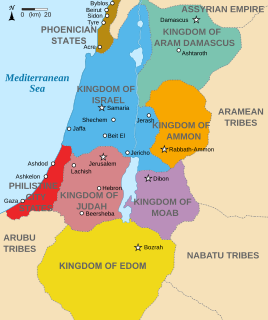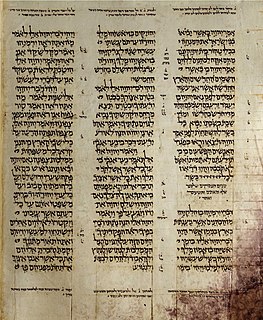Related Research Articles

The Book of Jeremiah is the second of the Latter Prophets in the Hebrew Bible, and the second of the Prophets in the Christian Old Testament. The superscription at chapter Jeremiah 1:1–3 identifies the book as "the words of Jeremiah son of Hilkiah". Of all the prophets, Jeremiah comes through most clearly as a person, ruminating to his scribe Baruch about his role as a servant of God with little good news for his audience.

The Book of Obadiah is an oracle concerning the divine judgment of Edom and the restoration of Israel. The text consists of a single chapter, divided into 21 verses, making it the shortest book in the Hebrew Bible. In Judaism and Christianity, its authorship is attributed to Obadiah, a prophet who lived in the Assyrian Period.

In religion, a prophet is an individual who is regarded as being in contact with a divine being and is said to speak on behalf of that being, serving as an intermediary with humanity by delivering messages or teachings from the supernatural source to other people. The message that the prophet conveys is called a prophecy.

Nevi'im is the second major division of the Hebrew Bible, between the Torah (instruction) and Ketuvim (writings). The Nevi'im are divided into two groups. The Former Prophets consists of the narrative books of Joshua, Judges, Samuel and Kings; while the Latter Prophets include the books of Isaiah, Jeremiah, Ezekiel, and the Twelve Minor Prophets.
Atbash is a monoalphabetic substitution cipher originally used to encrypt the Hebrew alphabet. It can be modified for use with any known writing system with a standard collating order.
Elam in the Hebrew Bible is said to be one of the sons of Shem, the son of Noah. The name is also used for the ancient country of Elam in what is now southern Iran, whose people the Hebrews believed to be the offspring of Elam, son of Shem. This implies that the Elamites were considered Semites by the Hebrews. Their language was not one of the Semitic languages, but is considered a linguistic isolate.
Seraiah or Sraya is the name of several people mentioned in the Hebrew Bible, and a name with other non-biblical uses.
Pashur or Pashhur was the name of at least two priests contemporary with the prophet Jeremiah and who are mentioned in the Book of Jeremiah. The name is of Egyptian origin, Pš-Ḥr.

Moab is the name of an ancient kingdom whose territory is today located in the modern state of Jordan. The land is mountainous and lies alongside much of the eastern shore of the Dead Sea. The existence of the Kingdom of Moab is attested to by numerous archaeological findings, most notably the Mesha Stele, which describes the Moabite victory over an unnamed son of King Omri of Israel, an episode also noted in 2 Kings 3. The Moabite capital was Dibon. According to the Hebrew Bible, Moab was often in conflict with its Israelite neighbours to the west.

Jeremiah, also called the "weeping prophet", was one of the major prophets of the Hebrew Bible. According to Jewish tradition, Jeremiah authored the Book of Jeremiah, the Books of Kings and the Book of Lamentations, with the assistance and under the editorship of Baruch ben Neriah, his scribe and disciple.
Gedaliah, Gedalia, Gedallah or Gedalya(h) was, according to the narratives in the Hebrew Bible's Book of Jeremiah and Second Book of Kings, appointed by Nebuchadnezzar II of Babylon as governor of Yehud province, which was formed after the defeat of the Kingdom of Judah and the destruction of Jerusalem, in a part of the territory that previously formed the kingdom. He was supported by a Chaldean guard stationed at Mizpah. On hearing of the appointment, the Jews that had taken refuge in surrounding countries returned to Judah.

The Book of Baruch is a deuterocanonical book of the Bible in some Christian traditions. In Judaism and Protestant Christianity, it is considered not to be part of the canon, with the Protestant Bibles categorizing it as part of the Biblical apocrypha. It is named after Baruch ben Neriah, Jeremiah's well-known scribe, who is mentioned at Baruch 1:1, and has been presumed to be the author of the whole work. The book is a reflection of a late Jewish writer on the circumstances of Jewish exiles from Babylon, with meditations on the theology and history of Israel, discussions of wisdom, and a direct address to residents of Jerusalem and the Diaspora. Some scholars propose that it was written during or shortly after the period of the Maccabees.

In Christianity the figures widely recognised as prophets are those mentioned as such in the Old Testament and the New Testament. It is believed that prophets are chosen and called by God.
Shaphan, son of Azaliah, is the name of a scribe or court secretary mentioned several times in the Hebrew Bible.
Ramah was a city in ancient Israel in the land allocated to the tribe of Benjamin, whose names means "height". It was located near Gibeon and Mizpah to the West, Gibeah to the South, and Geba to the East. It has been identified with modern Er-Ram, about 8 kilometres (5.0 mi) north of Jerusalem.

Jeremiah 9 is the ninth chapter of the Book of Jeremiah in the Hebrew Bible or the Old Testament of the Christian Bible. This book contains prophecies attributed to the prophet Jeremiah, and is one of the Books of the Prophets.

Jeremiah 25 is the twenty-fifth chapter of the Book of Jeremiah in the Hebrew Bible or the Old Testament of the Christian Bible. This book contains prophecies attributed to the prophet Jeremiah, and is one of the Books of the Prophets. Chapter 25 is the final chapter in the first section of the Book of Jeremiah, which deals with the earliest and main core of Jeremiah's message. In this chapter, Jeremiah identified the length of the time of exile as seventy years.

Jeremiah 49 is the forty-ninth chapter of the Book of Jeremiah in the Hebrew Bible or the Old Testament of the Christian Bible. This book contains prophecies attributed to the prophet Jeremiah, and is one of the Books of the Prophets. This chapter is part of a series of "oracles against foreign nations", consisting of chapters 46 to 51. In particular, chapters 46-49 focus on Judah's neighbors.

Jeremiah 31 is the thirty-first chapter of the Book of Jeremiah in the Hebrew Bible or the Old Testament of the Christian Bible. It is numbered as Jeremiah 38 in the Septuagint. The book contains prophecies attributed to the prophet Jeremiah, and is one of the Books of the Prophets (Nevi'im). This chapter is notable for the passage about the "New Covenant" (31:31-34) of God with His restored people and the quoting of 31:15 in the “Massacre of the Innocents" narrative. The Jerusalem Bible refers to chapters 30 and 31 as "the Book of Consolation", and Lutheran theologian Ernst Hengstenberg calls these two chapters "the triumphal hymn of Israel’s salvation".
References
- ↑ J. Bright, Jeremiah (Anchor Bible). New York: Doubleday, 1965.